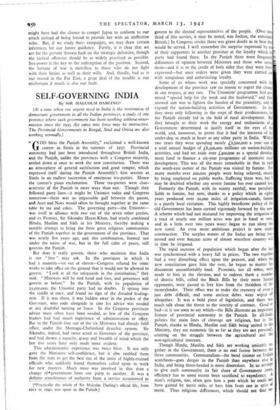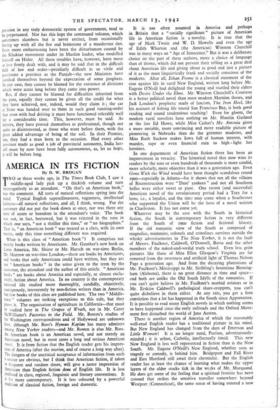SELF-GOVERNING INDIA
By SIR MALCOLM DARLING* [At a time when one urgent need in India is the restoration of democratic government in all the Indian provinces, a study of one province where such government has been working without-inter- mission since the 1935 Act came into force may be instructive. The Provincial Governments in Bengal, Sind and Orissa are also working normally.]
GOD bless the Punjab Assembly," exclaimed a well-known caterer in Simla in the summer of 1937. Provincial autonomy had just been introduced throughout British India, and the Punjab, unlike the provinces with a Congress majority, settled down at once to work the new constitution. There was an atmosphere of general satisfaction and good temper, which expressed itself during the Punjab Assembly's first session at Simla in an endless succession of enormous tea-parties. Hence the caterer's pious exclamation. These tea-parties were char- acteristic of the Punjab in more ways than one. Though they followed party lines—it might be Unionist today and Congress tomorrow—there was no impassable gulf between the guests, and Ayes and Noes would often be brought together at the same table by tea and cakes. The governing party—the Unionist— was itself in alliance with two out of the seven other parties, and its Premier, Sir Sikander Hayat-Khan, had wisely combined Hindu, Muslim and Sikh in his Ministry, thereby making a notable attempt to bring the three great religious communities of the Punjab together in the government of the province. That was nearly five years ago, and this combination, formed not under the stress of war, but in the full calm of peace, still governs the Punjab.
But does it really govern, those who maintain that India is not " free " may ask. In the provinces in which it had a majority—six out of eleven—Congress refused for some weeks to take office on the ground that it would not be allowed to govern. " Look at all the safeguards in the constitution," they said. " Ministers will be tied hand and foot, and governors will govern as before." In the Punjab, with its population of 25,000,000, the Unionist party had no doubts. It sprang into the saddle at once, and found no sign of the dreaded leading- rein. If it was there, it was hidden away in the pocket of the Governor, who rode alongside in case his advice was needed at any doubtful turning or fence. In the Congress provinces advice must often have been needed, as few of the Congress leaders had had much experience of administration or office. But in the Punjab four out of the six Ministers had already held office, under the Montagu-Chelmsford dyarchic system. Sir Sikander, indeed, had twice acted as Governor of the province, and had shown a sagacity, grasp and breadth of mind which the last five years have only made more evident.
This administrative experience was twice blest. It not only gave the Ministers self-confidence, but it also enabled them from the start to get the best out of the army of highly-trained officials who suddenly found themselves called upon to work for new masters. Much more was involved in this than a change of•government from one party to another. It was a definite transference of authority from a service accustomed to [*Practically the whole of Sir Malcolm Darling's official life, from ,zsaz to 194o, was spent in the Punjab.] govern to the elected representatives of the people. (Over one third of this service, it may be noted, was Indian, the remaind British.) In Congress circles there was grave doubt as to how th would be served. I well remember the surprise expressed by on of their supporters in another province at the loyalty which his party had found there. In the Punjab there were frequently differences of opinion between Ministers and those who served them—and it is to the credit of both sides that they were freely expressed—but once orders were given they were carried out with scrupulous and unhesitating loyalty.
Some of us whose work was specially concerned with the development of the province saw no reason to regret the change in one respect, at any rate. The Unionists' programme had pro- mised " special help for the weak and the backward," and their avowed aim was to lighten the burden of the peasantry, and to expand the nation-building activities of Government. in this they were only following in the steps of their predecessors, for the Punjab already led in the field of rural development. But they brought to their work the energy and enthusiasm of a Government determined to justify itself in the eyes of the world, and, moreover, to prove that it had the interests of the under-dog as much at heart as any other party in India. Within two years they were spending nearly £2,500,000 a year out of a total annual budget of £8,500,000 millions on nation-building activities, and had set aside over £400,bo0 as a special develop- ment fund to finance a six-year programme of intensive rural development. This was all the more remarkable in that in 1938 the south-east corner of the Punjab was visited by famine. For many months over 200,000 people were being relieved, mostly by being employed on public works. Suffering there was, but it may be doubted whether any severe famine has ever caused less.
Formerly the Punjab, with its scanty rainfall, was peculiarly liable to famine, but now, thanks to a policy which in eighty years produced over 20,000 miles of irrigation-canals, famine is a purely local visitation. This highly beneficent policy of the old Government has been carried vigorously forward by the new. A scheme which had just matured for improving the irrigation of a tract of nearly one million acres was put in hand at once, and in a little over two years water began to run along the new canal. An even more ambitious project is now under construction. The surplus waters of the Indus are being har- nessed and over 800,000 acres of almost waterless country will in time be irrigated.
The rapid increase of population which began after the last war synchronised with a heavy fall in prices. The two together had a very disturbing effect upon the peasant, and when the new constitution gave him the vote, he began to mutter his discontent uncomfortably loud. Promises, not all sober, were made to him at the election, and to redeem them a number of drastic bills, called the Black Bills by their more heated opponents, were passed to free him from the thraldom of the moneylender. Their effect was to make the recovery of even a just debt difficult, and some ancient debts were wiped off altogether. It was a bold piece of legislation, and there Was much talk about the threat to the sanctity of contract. Good or bad—it is too soon to say which—the Bills illustrate an important feature of provincial autonomy in the Punjab. In all-India politics the main lines of cleavage are religious, but in the Punjab, thanks to Hindu, Muslim and Sikh being united in the Ministry, they are economic (in so far as they are not personal), centring on the struggle between the agricultural and the non-agricultural interests.
Though Hindu, Muslim and Sikh are working amicably to- gether in the Government, there is no real fusion between the three communities. Communalism—the bend sinister on India scutcheon—goes deeper in the Punjab than anywhere else 10 India, and being three-headed is more discordant. In an attempt to give each community its fair share of Government posts, efficiency has to some extent been sacrificed to expeciienCy. man's religion, too, often gets him a post which he could not have gained by merit only, or bars him from one in spite d merit. Thus religious differences, which should not find el" pression in any truly democratic system of government, tend to be perpetuated. Nor has this kept the communal volcano, which sometimes slumbers but is never extinct, from occasionally flaring up with all the fire and brimstone of a murderous riot. Even more embarrassing have been the disturbances caused by the Khaksar movement under its Muslim leader, who modelled himself on Hitler. All these troubles have, however, been more or less firmly dealt with, and it may be said that in the difficult field of law and order—peculiarly difficult in so virile and passionate a province as the Punjab—the new Ministers have justified themselves beyond the expectation of some prophets. In any case, they cannot be blamed for the existence of divisions which were acute long before they came into power.
But, if they cannot be blamed for difficulties inherited from the past, equally they cannot be given all the credii for what they have achieved, nor, indeed, would they claim it ; the car of State was handed over to them in such good running-order that even with bad driving it must have functioned tolerably well for a considerable time. This, however, must be said. As drivers, they have proved themselves as professional, though not quite as disinterested, as those who went before them, with the great added advantage of being of the soil. In their Premier, too, they had a man born to the occasion. Had every other province made as good a job of provincial autonomy, India her- self must by now have been fully autonomous, as, let us hope, it will be before long.



























 Previous page
Previous page